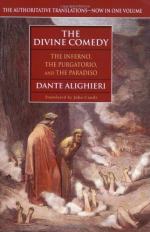“Within the pearl, that now encloseth us,
Shines Romeo’s light, whose goodly deed and
fair
Met ill acceptance. But the Provencals,
That were his foes, have little cause for mirth.
Ill shapes that man his course, who makes his wrong
Of other’s worth. Four daughters were
there born
To Raymond Berenger, and every one
Became a queen; and this for him did Romeo,
Though of mean state and from a foreign land.
Yet envious tongues incited him to ask
A reckoning of that just one, who return’d
Twelve fold to him for ten. Aged and poor
He parted thence: and if the world did know
The heart he had, begging his life by morsels,
’T would deem the praise, it yields him, scantly
dealt.”
CANTO VII
“Hosanna Sanctus Deus Sabaoth
Superillustrans claritate tua
Felices ignes horum malahoth!”
Thus chanting saw I turn that substance bright
With fourfold lustre to its orb again,
Revolving; and the rest unto their dance
With it mov’d also; and like swiftest sparks,
In sudden distance from my sight were veil’d.
Me doubt possess’d, and “Speak,”
it whisper’d me,
“Speak, speak unto thy lady, that she quench
Thy thirst with drops of sweetness.” Yet
blank awe,
Which lords it o’er me, even at the sound
Of Beatrice’s name, did bow me down
As one in slumber held. Not long that mood
Beatrice suffer’d: she, with such a smile,
As might have made one blest amid the flames,
Beaming upon me, thus her words began:
“Thou in thy thought art pond’ring (as
I deem),
And what I deem is truth how just revenge
Could be with justice punish’d: from which
doubt
I soon will free thee; so thou mark my words;
For they of weighty matter shall possess thee.
“That man, who was unborn, himself condemn’d,
And, in himself, all, who since him have liv’d,
His offspring: whence, below, the human kind
Lay sick in grievous error many an age;
Until it pleas’d the Word of God to come
Amongst them down, to his own person joining
The nature, from its Maker far estrang’d,
By the mere act of his eternal love.
Contemplate here the wonder I unfold.
The nature with its Maker thus conjoin’d,
Created first was blameless, pure and good;
But through itself alone was driven forth
From Paradise, because it had eschew’d
The way of truth and life, to evil turn’d.
Ne’er then was penalty so just as that
Inflicted by the cross, if thou regard
The nature in assumption doom’d: ne’er
wrong
So great, in reference to him, who took
Such nature on him, and endur’d the doom.
God therefore and the Jews one sentence pleased:
So different effects flow’d from one act,
And heav’n was open’d, though the earth
did quake.
Count it not hard henceforth, when thou dost hear
That a just vengeance was by righteous court
Justly reveng’d. But yet I see thy mind
By thought on thought arising sore perplex’d,
And with how vehement desire it asks
Solution of the maze. What I have heard,
Is plain, thou sayst: but wherefore God this
way
For our redemption chose, eludes my search.




